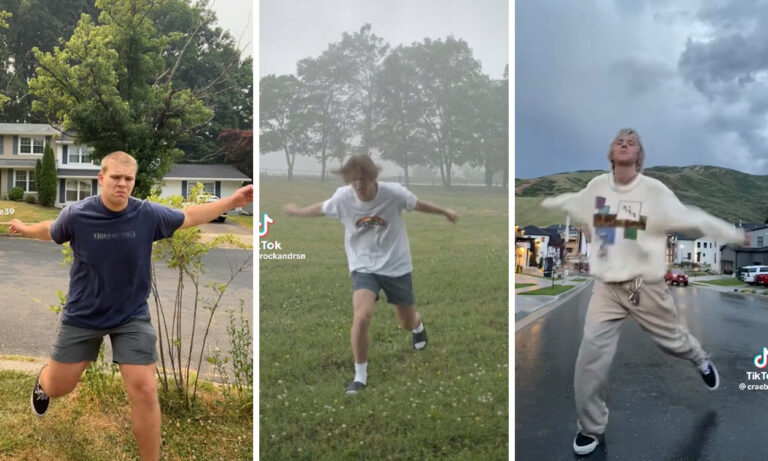What is the Pinegrove Shuffle? The new TikTok dance resurrecting a band with a controversial past

TikTok has a knack for chewing up and spitting out viral trends. From the Grimace Shake to countless embarrassing millennial clips, it’s hard to keep up. Enter the ‘Pinegrove Shuffle’, the newest trend to add to the app’s arsenal of viral dances.
If you’ve tapped into the TikTok hive mind anytime in the last few weeks, you’ve probably already seen this bizarre (and often cringe-inducing) viral dance during one of your doomscrolling sessions. If by some chance you haven’t though, let me fill you in. Picture this: a slow, rhythmic dance—with straight-faced individuals lunging forward in a spreadeagled fashion—all synchronised to a folky acoustic guitar riff. The song is actually the opening of the track ‘Need 2’ by the American indie rock band Pinegrove (hence the name, Pinegrove Shuffle).
@garrettlee39 Pine muthafreakin grove
♬ need 2 - audios 🌷
But how did the trend start? According to a recent article by Mashable, this booming trend was the brainchild of one man: Garrett Lee. On 9 June 2023, Lee posted a video of himself doing the dance which soon caught on. And thus, the Pinegrove Shuffle was born, with the dance now having millions of views by thousands of creators.
TikTok’s tight grip on the music industry
For better or worse, TikTok has managed to weave its way into the fabric of the music industry. While social media platforms have been a valuable way for artists to share their music and build a strong community for decades now, the nature of TikTok—being an app that can quickly kickstart virality, even to those unfamiliar with the artists to begin with—has proved invaluable.
And the data backs this up too. Songs that trend on TikTok often end up charting on the Billboard Hot 100 or Spotify Viral 50. Think Steve Lacy’s ‘Bad Habit’ or Piri & Tommy Villiers’ ‘soft spot’—just a couple of the many artists who have managed to jump-start their careers, propelled into fame in the blink of an eye thanks to the virality of TikTok.
According to a November 2021 study conducted for TikTok by the music analytics company MRC Data, 67 per cent of the video-sharing app’s users are more likely to seek out songs on music streaming services after hearing them on TikTok.
Pinegrove now appears to be following in the same footsteps, rising from around 500,000 monthly listeners in May 2023 to over 2,000,000 today. It’s no surprise then that the platform has gained the attention of big players in the music industry business.
“TikTok has really become a critical part of artist storytelling,” Kristen Bender, SVP of digital innovation strategy and business development at Universal Music Group, told Insider in an interview. “Our labels have been extremely leaned into the platform.”
The complicated history of Pinegrove’s virality
And yet, while the band revels in its viral resurgence, it’s hard to ignore the dark history that surrounds one of its members. Let me explain. In short, Pinegrove is a band led by lead singer and songwriter Evan Stephens Hall. During the early to mid-2010s, Pinegrove’s emotion-inducing and heartfelt lyrics won them a loyal following stretching across punk, emo and alternative scenes.
Back then, they were the benign sweethearts of the scene—the unassuming, slightly dorky group loved by the fans and the press alike. However, in 2017, the frontman Hall shocked everyone by releasing a strange and confusing statement on Facebook, stating that he had been “accused of sexual coercion.”
The band then took a year out, in order for Hall to work on himself, before returning to the stage in 2018. That year, they released new music along with a long-read interview published by Pitchfork that left fans even more puzzled. Followers of Pinegrove were left with the all-too-familiar decision: separate the art from the artist and keep supporting the group, or cut ties and stop listening. Many took the latter.
The result? Pinegrove, at best, plateaued in popularity. A band once adored by millennial fans and the music press alike fell into the background. They kept stringing on for a few years after that, but in April 2023, Hall confirmed that the group would be going on a hiatus, operating “on a more casual basis,” following the departure of drummer and co-founder Zack Levine.
And yet, not even two months after the band broke the news of a hiatus, they were once again thrown into the limelight—this time, thanks to a younger gen Z audience. Because of the new dance trend, Pinegrove is now witnessing a bizarre second resurgence, with many of their new fans not aware of their past controversies.
Love or loathe the Pinegrove Shuffle, it’s an intersecting topic to open up and dissect. One: it shows how TikTok can give old songs new life, transcending generations and audiences (even if that’s through sometimes embarrassing dances). And two: virality is random in nature, often lacking context or analysis. Sure, the Pinegrove Shuffle has every component to be a catchy trend, but would it really have caught on if Hall’s problematic history was more widely known? I don’t think so.
So, next time you’re tempted to jump right on the latest viral trend, make sure to do your research first.





